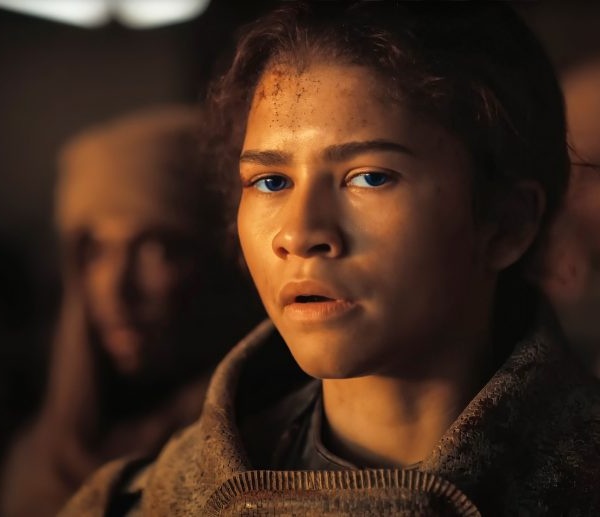In 2023, Dave Bautista made headlines by lamenting that he’s never received an offer to star in a romantic comedy, saying he looks in the mirror and asks himself “‘Is there something that unappealing about me that excludes me from these parts?’” The admission was a shame, because Bautista — undeniably the Marlon Brando of wrestlers-turned-actors — has all the qualities you could want in a rom-com star. In supporting parts like a meatheaded alien in the “Guardians of the Galaxy” films, a roided-up influencer in “Glass Onion,” and a calm acolyte of God in “Knock at the Cabin,” Bautista has demonstrated great comedic timing, a commanding and effortless screen presence, and a surprising sensitivity that makes him and his hulking frame appealing.
Alas, Bautista hasn’t gotten a straightforward rom-com vehicle yet. But, while it’s probably not the type of movie he was thinking of when he made his initial plea to become America’s sweetheart, “The Killer’s Game” comes closer than expected. From stunt choreographer-turned-director J. J. Perry, the R-rated Lionsgate release is a bloody action-comedy that struggles to pair its two separate genres together into a cohesive whole. Interestingly though, it’s at its best not when it’s placing Bautista in guts-and-gore-filled fights, but when it’s letting the actor do his best Hugh Grant impression as a sad sack just looking for love.
On paper, the actor’s Joe Flood isn’t your stereotypical rom-com lead, but he has the essential core of the archetype down pat: he’s lonely, attached to his job, and desperate for companionship. The main departure is that his career isn’t journalism or architecture but being the most deadly and renowned hitman in all of Europe, traveling all over the continent from his Budapest base of operations to slay criminals and other assassins with ruthless efficiency. That line of work has left Joe a bit socially stunted, to the point that when he has his meet-cute at the start of the film — escorting modern dancer Maizie (Sofia Boutella) out of her concert hall following a gunfight he started — he can barely formulate words speaking to her, especially when she gives him her number and an invite to dinner.
The film’s early going leans heavily on humor and sweetness as Joe comes out of his shell to court the far more expressive Maizie, a choice that works rather well because Bautista is such a natural in this element. He can make a clichéd scene where Joe agonizes over an opening text line to Maizie into something funny and fresh just through his sighs and body language. With Boutella, he finds a natural, unfussy chemistry that overcomes the extremely surface-level writing Maizie is rendered with. And it’s lightly amusing to watch a rom-com plot filtered through the lens of a brutal action film: Ben Kingsley scores some laughs as Joe’s handler, who also doubles as the best friend pushing his buddy to find love by quoting Dolly Parton lyrics at him.
The film seems to be enjoying itself in this mode too, as it takes an overly long time to get to the actual main impetus of the plot: Joe gets diagnosed with a rare chronic brain disease, which has no known cure. Distraught, he takes out a life insurance policy and orders a hit on himself from rival assassin broker Marianna (Bautista’s old “Guardians” scene partner Pom Klementieff, having fun with limited screentime), who is all too happy to fulfull it considering she’s carried a grudge against the man for killing her father ages ago. He then dumps Maizie to protect her in a wildly melodramatic scene that contains dialogue like “When you’re on your deathbed, remember what you had and what you threw away.”
That scene sticks out like a sore thumb in an otherwise wildly unserious film, but it leads to the funniest rug pull in the movie when Joe sends Maizie a gushy voice note proclaiming his love, only to get an urgent call from his doctor who reveals there’s was a mess-up at the lab and Joe’s been misdiagnosed: his recent frequent headaches aren’t a harbinger of his impending death but a sign he maybe needs to look into glasses. He gets the news at a very inconvenient time: Marianna has already called in a crew of killers with a hefty $4 million bounty on Joe’s head, among them sharpshooter Lovedahl (an amusing if underserved Terry Crews), and she’s unwilling to call them off just because Joe’s had a change in circumstances. So, to protect himself and Maizie from the killers, Joe has to crack his knuckles and spill some blood.

There’s a lot of fun to be had in this premise, but as it goes on, Perry’s film struggles to make the most of it. The world he places us in feels frustratingly underdeveloped: think a more half-baked, boring version of the assassin community in the “John Wick” films where every hit is ordered via a phone app. (The film’s title comes from the terminology Joe and his associates use to refer to the murder business as a game, one that you either “get out clean” from or “go out on your back” from.) The pacing is wonky, with the set-up taking an inordinate amount of time while the actual conflict between Joe and the assassins gets rushed through at dizzying speeds. Most of the assassins are introduced via stylized intros where their names are written, comic book style, in smoke/neon/cocaine/blood/etc. It’s an enjoyable choice until you realize that these cutaways comprise 70 percent of the runtime for most of these antagonists.
Things aren’t much better when Joe comes face to face with the other hitman. Perry gives the film a slick but forgettable look (Budapest has never been more anonymous in a movie than it is here), but his experience as a stunt choreographer shows in some of the inventive and fluid hand-to-hand fighting that Bautista engages in. There’s a pleasant satisfaction in seeing just how gory the film is willing to go, with dislodged limbs and blood spilling rapidly out of necks. But too often the fights fail to exhilarate, landing in competent and uninspired territory; one battle with a ballroom dancing assassin has a dispiriting lack of genuinely interesting choreography, and too many of the confrontations end with a quick and easy explosion over something more memorable. The final fight is so lacking in stakes or escalation compared to what came before that it’s a mild surprise when you realize this is the last big setpiece before the film hastily wraps up.
With the action part of the action comedy mostly a wash, the comedy and the romance have to do a lot of heavy lifting. And “The Killer’s Game” is genuinely funny, with amusing bits like Joe confessing his long, long list of sins to a priest that are snappy and quick and provoke a laugh. The romance, despite its strong start, begins to wither and frustrate over the film’s course, however, as it exits fizzy rom-com territory and starts to take on a more dramatic tone. Maybe the pivot would work better if Boutella were given more to do. An action film veteran, the Algerian star is certainly working with a more competent script than her most recent vehicle “Rebel Moon,” but she’s stranded in a nothing character that often frustrates with her blind devotion to Joe and a disappointing lack of opportunity to kick ass on her own. “The Killer’s Game” finally gives Dave Bautista a great rom-com part to play, so it’s a shame that his rom-com leading lady isn’t given the same opportunity to fully pop.
Grade: C+
Lionsgate will release “The Killer’s Game” in theaters on Friday, September 13.
Want to stay up to date on IndieWire’s film reviews and critical thoughts? Subscribe here to our newly launched newsletter, In Review by David Ehrlich, in which our Chief Film Critic and Head Reviews Editor rounds up the best reviews, streaming picks, and offers some new musings, all only available to subscribers.








